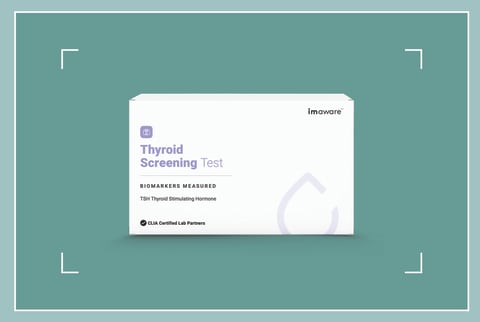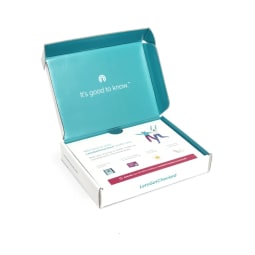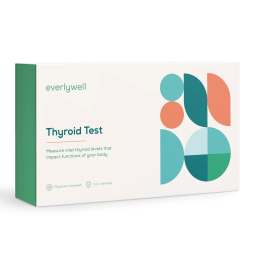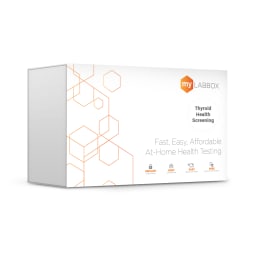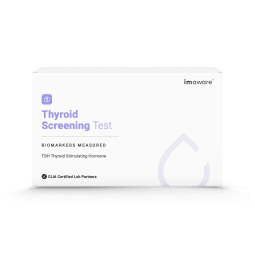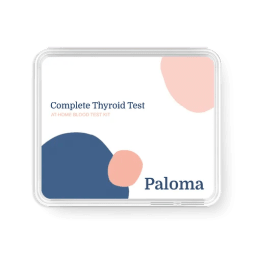Awareness of your thyroid hormone levels can be key to unlocking a deeper understanding of your health, especially when you consider more than 60% of people with thyroid disease are completely unaware of their condition. Luckily at-home testing has made it easier than ever to test your thyroid levels. (Of course, it’s also a blood test you should ask for at your annual visit.) Often cheaper and more accessible than an office visit, at-home thyroid tests check the same hormone levels as the tests offered by your healthcare practitioner—we’ll get more into that later—and are offered by a variety of brands. But how do you know which companies are reliable? Below, we’ve rounded up the five best at-home thyroid tests offering accurate, valuable results. These hormones regulate our system metabolism and cellular energy, according to Revée Barbour, N.D., M.S., naturopathic doctor, and owner of Dr. Ray, N.D., in Sacramento, Calif. As a result, your thyroid impacts pretty much every aspect of your body’s function, whether that’s your body temperature or weight. In fact, you’d be hard pressed to find something your thyroid didn’t impact. When thyroid hormone levels are low, also called hypothyroidism, all metabolic processes in your body slow down, explains naturopathic physician Andrew Neville, N.D. Many people with hypothyroidism experience fatigue, constipation, weight gain, hair loss, and depression. An underactive thyroid is one of the most common thyroid conditions, affecting 5% of the global population1. Hyperthyroidism is on the other end of the spectrum. It occurs when the thyroid is hyperactive and produces too many thyroid hormones. This speeds up your metabolism and can cause symptoms like rapid weight loss, irregular heart beats, and sweating. Instead TSH is produced by the pituitary gland and triggers the production of T3 and T4. TSH levels typically spike when T3 and T4 levels are low, indicating the body needs to produce more of these hormones (or vice versa). While the most affordable thyroid tests only look at the TSH, this biomarker does not provide a complete picture of your thyroid’s function. Only looking at TSH assumes the body is operating normally and that no other issues are at play, which is a drastic oversimplification of the bodily process. In fact, a 2018 study2 found that screening for thyroid issues using a TSH test can actually miss hypothyroidism. Therefore, a normal TSH level does not ensure the thyroid is operating normally. The most comprehensive view of your thyroid’s function includes direct tests of T3 and T4 levels, as well as thyroid antibodies and Reverse T3 or rT3. As previously mentioned, the first two are hormones directly produced by the thyroid. When testing, you can look at either your total levels of the hormones or the free levels, which are written at FT3 and FT4 or free T3 and T4. These “free” hormones are not bound to thyroxine-binding globulin, and are considered highly sensitive assays that are better to identify disease. While most of the tests on our list look at FT3 and FT4, only a handful also keep on eye on rT3. When the body converts T4 to T3, it creates rT3 or an inactive form of T3 in specific ratios. Occasionally, the body may be blocked from making T3, instead overproducing rT3. This metabolite acts like a brake on the thyroid’s function, slowing down metabolism. As a result, it kickstarts many of the same symptoms as hypothyroidism, including weight gain. Both illness and chronic stress3 have been tied to high rT3 levels—which means it’s another important test to consider when making your selection. Most tests are evaluated by a remote physician in a CLIA-certified lab, ensuring comparable accuracy to a local lab. With any at-home test, there is room for user error. Submitting too little or too much blood, mislabeling the sample, or compromising the blood sample with germs can interfere with the results. (However, most brands offer free replacements.) Plus, there are numerous benefits of using an at-home thyroid test, and one of them is that most tests qualify as a “medical expense,” so you can use an HSA or FSA account to pay for it! And while at-home thyroid tests are definitely a useful tool for many, it’s important to turn to your healthcare provide to best understand your results. So even though some brands offer virtual consultations with a prescribing physician to help find the best treatment or remedies to help with thyroid issues, we still recommend partnering with a thyroid-focused endocrinologist. Remember: At-home testing should never be used as a replacement for care from a healthcare practitioner. Both tests require a blood sample, and results are reported to a convenient app on your phone in 2 to 5 days. Any questions raised by your results can be answered in a free consult with a nurse. However, further testing and treatment will need to go through your healthcare provider. With over 15,000 reviews and a 4.5-star rating, LetsGetChecked is well-liked by users. Plus, the company’s sleek and discreet packaging is easy to read and understand. If you want to know more about LetsGetChecked, you can also see a registered nurse’s full review of the at-home testing process. Community Perk: Save 25% on your at-home thyroid test with the code MBG25. The membership option makes Everywell a top pick for those with a thyroid disorder who need to continually monitor thyroid levels to evaluate the efficiency of medication doses, as it makes testing far more affordable. Similar to other options, it requires a blood sample via fingerprick. Without a subscription, the final cost is higher than other brands, but it also includes a consultation with a board-certified physician in your state who can prescribe medication (if needed). When results are ready, you can access them in an online portal, along with a consultation with a physician. In select states, these physicians can even prescribe medications. Plus, they’re covered by HSA and FSA, and keep results securely locked down with HIPAA security protocols. A great starting point for those curious about thyroid functioning, it gives the initial insights needed to begin your journey into understanding your thyroid health. Just note the brand does not offer any follow-up for test results, meaning you’ll have to discuss with your healthcare provider for more information. However, it is FSA- and HSA-approved with results available in about a week. Every blood sample collected is tested for FT3, FT4, TSH, and thyroid antibodies. For an additional fee, you can add on Reverse T3 testing, making this the most comprehensive option on the market. One of Paloma’s best features is that it offers a free phone consultation with a care manager even before you make a purchase. Although the physician consults are not included in the price, they can be billed to your insurance or paid out of pocket for $42. Due to state regulation, the test cannot be used currently in New York, New Jersey, Maryland, or Rhode Island. Additionally, Paloma focuses on hypothyroid, which is low-thyroid hormone only. If your results reveal you have hyperthyroidism (high thyroid), then you will need to discuss further with your healthcare provider.



